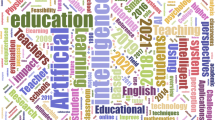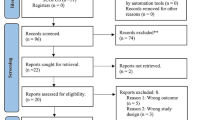Abstract
The evolution of COVID resulted in lockdown, which led to utilization of Artificial Intelligence (AI) for education. Before, COVID's use of AI was limited and people were skeptical, COVID opened the debate again for the inclusion of AI in education. In this paper, the potential benefits and demerits of AI are discussed. A survey is also conducted on a group of students to determine whether the utilization of AI is better or physical (face-to-face) learning approach is more efficient. The survey is conducted on a group of engineering students for understanding concepts of Communication Engineering. The survey included students’ performance, their understanding, working or non-working, improvement in understanding with the help of graphics, improvement in writing skills, test preparation, assessment, and feedback on demerits.
Access this chapter
Tax calculation will be finalised at checkout
Purchases are for personal use only
Similar content being viewed by others
References
Marshall, J.A., Young, E.S.: Preservice teachers’ theory development in physical and simulated environments. J. Res. Sci. Teach. 43(9), 907–937 (2006)
Vosniadou, S., Ioannides, C., Dimitrakopoulou, A., Papademetriou, E.: Designing learning environments to promote conceptual change in science. Learn. Instr. 11(5), 381–419 (2001)
Adesoji, F., Raimi, A.: Effects of Enhanced Laboratory Instructional Technique on Senior Secondary Students’ Attitude Toward Chemistry in Oyo Township, Oyo State Nigeria. J. Sci. Educ. Technol. 13(3), 377–385 (2004)
Edwards, B.I., Cheok, A.D.: Why not robot teachers: artificial intelligence for addressing teacher shortage. Appl. Artif. Intell. 32(4), 345–360 (2018)
Richter, O.Z., Marín, V.I., Bond, M., Gouverneur, F.: Systematic review of research on artificial intelligence applications in higher education – where are the educators? Int. J. Educ. Technol. High. Educ. 16, 39 (2019)
Chen, X., Xie, H., Zou, D., Hwang, G.J.: Application and theory gaps during the rise of artificial intelligence in education. Computers and Education: Artificial Intelligence 1, 100002 (2020)
Lucena, I., Aznar-Díaz, I.A., Cáceres-Reche, M.P., Romero-Rodríguez, J.M.: Artificial intelligence in higher education: a bibliometric study on its impact in the scientific literature. Educ. Sci. 9, 51 (2019)
Tang, K.Y., Chang, C.Y., Hwang, G.J.: Trends in artificial intelligence-supported e-learning: a systematic review and co-citation network analysis (1998–2019). Interactive Learning Environments (2021)
Kabudi, T., Pappas, I., Olsen, D.H.: AI-enabled adaptive learning systems: a systematic mapping of the literature. Comput. Educ. Artif. Intell. 2, 100017 (2021)
Bates, T., Cobo, C., Mariño, O., Wheeler, S.: Can artificial intelligence transform higher education?. Int. J. Edu. Technol. Higher Edu. 17, 42 (2020)
Losper, B., Balyan, V., Groenewald, B.: Development of Distributed Data Acquisition System. In: Vasant, P., Zelinka, I., Weber, G.-W. (eds.) ICO 2021. LNNS, vol. 371, pp. 867–878. Springer, Cham (2022). https://doi.org/10.1007/978-3-030-93247-3_82
Author information
Authors and Affiliations
Corresponding author
Editor information
Editors and Affiliations
Rights and permissions
Copyright information
© 2023 The Author(s), under exclusive license to Springer Nature Switzerland AG
About this paper
Cite this paper
Balyan, V. (2023). Influence of COVID and AI on Teaching and Learning. In: Vasant, P., Weber, GW., Marmolejo-Saucedo, J.A., Munapo, E., Thomas, J.J. (eds) Intelligent Computing & Optimization. ICO 2022. Lecture Notes in Networks and Systems, vol 569. Springer, Cham. https://doi.org/10.1007/978-3-031-19958-5_13
Download citation
DOI: https://doi.org/10.1007/978-3-031-19958-5_13
Published:
Publisher Name: Springer, Cham
Print ISBN: 978-3-031-19957-8
Online ISBN: 978-3-031-19958-5
eBook Packages: Intelligent Technologies and RoboticsIntelligent Technologies and Robotics (R0)




